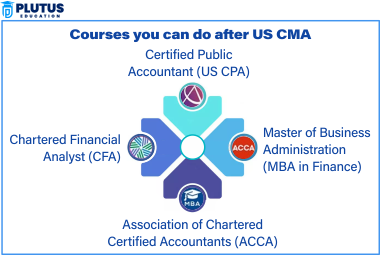The US CMA Course (Certified Management Accountant) is a prestigious professional certification offered by the Institute of Management Accountants (IMA), aimed at preparing individuals for senior roles in management accounting and financial management. Globally recognized, this course focuses on developing expertise in strategic management, financial planning, decision‑making, budgeting, and risk management. Designed for professionals and students aspiring to build international careers in finance, the US CMA Course equips candidates with the analytical and managerial skills needed to excel in dynamic corporate environments. Completing this certification opens pathways to lucrative career opportunities worldwide across industries such as manufacturing, consulting, IT, and banking.
US CMA Course Details
CMA full form is Certified Management Accountant specifically designed for professionals in accounting and finance. Offered by the Institute of Management Accountants (IMA), this credential reflects a deep knowledge of management accounting principles. Each year over 115,000 students from around the world pursue CMA courses in the USA, seeking to enhance their skills and career prospects. The CMA certification not only showcases a candidate’s proficiency but also throws open the doors to numerous opportunities in the area of management accounting hence qualifying as a desirable achievement for wannabe money professionals.
| CMA USA Certification | Details |
| Exam Structure | Part 1: Financial Planning, Performance, and Analytics |
| Part 2: Strategic Financial Management | |
| Course Duration | Must be completed within 3 years from the registration date |
| Exam Dates 2025 | January 1 to February 28, 2025 |
| May 1 to June 30, 2025 | |
| September 1 to October 31, 2025 | |
| Course Fees | Professional Members:– 1. Entrance Fee: USD 300 2. Exam Fee: USD 495 per part 3. IMA Membership Fee: USD 295 |
| Student/Academic Members:– 1. Entrance Fee: USD 225 2. Exam Fee: USD 370 per part 3. IMA Membership Fee: USD 49 or USD 160 | |
| CMA Pass Rate | Approximately 50% average for Part 1 and Part 2 (varies by geographic region) |
| Salary (Total Annual) | Mean Salary: USD 86,924 |
| Median Salary: USD 67,500 | |
| Eligibility Criteria | 1.Bachelor’s degree from an accredited institution 2. Two continuous years of professional experience in management accounting or financial management 3. Active IMA membership |
| Registration Process | 1. Become an IMA member |
| 2. Pay the CMA entrance and exam fees | |
| 3. Receive authorization to schedule the exam | |
| 4. Schedule the exam with Prometric within the chosen testing window |
Roles & Responsibilities of CMA
The Certified Management Accountant (CMA) is a professional certification that demonstrates expertise in financial planning, analysis, control and decision support. The key roles and responsibilities of a CMA include providing strategic financial guidance, managing budgets and forecasts, conducting cost analysis, and helping organizations make data-driven business decisions.
- Financial Planning and Analysis: CMAs analyze financial statements, create financial models, and provide insights into organizational financial health. They help businesses forecast revenue, manage expenses, and maximize profitability.
- Budgeting and Cost Management: CMAs play a crucial role in preparing and monitoring budgets. They evaluate budget performance and ensure resources are used efficiently by identifying cost-saving opportunities.
- Internal Controls and Risk Management: CMAs design and implement internal control systems to minimize risks, maintain compliance with financial regulations, and protect organizational assets.
- Strategic Planning and Decision-Making: CMAs participate in strategic decision-making by providing data-driven insights. They analyze various financial scenarios and assess their impact on business objectives.
CMAs are trusted advisers within their organizations, bridging the gap between accounting and strategy. Their expertise in financial management makes them integral to organizational success.
“Hidden Benefits of CMA US 😱 | Why CMA US is the Game-Changer for Your Career!”
CMA Eligibility Criteria
The CMA eligibility criteria outlines the requirements to become a CMA. This includes having a bachelor’s degree, meeting specific work experience in management accounting or financial management, and passing a comprehensive two-part exam covering topics like financial planning, analysis, control, decision support, and professional ethics. Fulfilling these criteria demonstrates the knowledge and skills needed to excel as a strategic management accountant.
- Bachelor’s Degree: Candidates must have a bachelor’s degree from an accredited institution. The IMA accepts degrees from international institutions, provided they are equivalent to a US bachelor’s degree.
- Work Experience Requirement: Candidates need to have at least two years of full-time work experience in management accounting or financial management. This requirement can be met either before or within seven years of passing the CMA exams.
- Membership with IMA: To maintain the CMA credential, candidates must be active members of the IMA and fulfill annual Continuing Professional Education (CPE) requirements. This membership also offers access to valuable resources like networking opportunities, industry updates, and learning materials.
Meeting the CMA eligibility criteria demonstrates candidates’ commitment to the field and ensures they are prepared for the responsibilities of a certified management accountant.
US CMA Exam
Candidates should have a clear understanding of the course and examination pattern to be able to appear for the CMA USA exam. It is important to be acquainted with the exam’s form for success in the certification. To be awarded the CMA credential, candidates must pass both parts of the CMA examination.
- The essay questions section is right after finishing the MCQ section.
- Candidates who score 50% or higher on the MCQs will be moving on to the essay portion of the exam.
- Candidates can sit Part 1 and Part 2 in either order, and even take both on one day if they wish.
- Each part of the exam is scored on a scale of 0 to 500; a score of at least 360 is required to pass each part.
- Results of the exam are emailed approximately 6 weeks after the end of the month in which the exam was taken. Results will also be available via the candidate’s website.
| CMA USA Exam Parts | Subject Area | Exam Format Details |
| Part 1 | Financial Planning, Performance, and Analytics | 100 Multiple-Choice Questions (MCQs) – 3 hours |
| Two Essay Questions (30 minutes each) – 1 hour | ||
| Part 2 | Strategic Financial Management | 100 Multiple-Choice Questions (MCQs) – 3 hours |
| Two Essay Questions (30 minutes each) – 1 hour |
CMA USA Exam Syllabus
The CMA USA exam is divided into two individual parts, where all syllabus topics fall across these two different parts. Every topic has a weightage assigned to it which helps in deciding individual topic importance in the examination. Candidates needs to understand the each and every topic deeply as per weightage assigned to them. Here is the subject-wise bifurcation of CMA USA exam for each level:
| Part 1: Financial Planning, Performance, and Analytics | Weightage | Part 2: Strategic Financial Management | Weightage |
|---|---|---|---|
| External Financial Reporting Decisions | 15% | Financial Statement Analysis | 20% |
| Planning, Budgeting, and Forecasting | 20% | Corporate Finance | 20% |
| Performance Management | 20% | Decision Analysis | 25% |
| Cost Management | 15% | Risk Management | 10% |
| Internal Controls | 15% | Investment Decisions | 10% |
| Technology and Analytics | 15% | Professional Ethics | 15% |
CMA Pass Rates and Scoring
From experience, the CMA exam is considered very tough, as its passing rate is usually within a range of 60%- 72% per part. The candidates must score at least 300 out of 500 possible points for each section of the exam.
Both performance in MCQs and essay-type questions contribute to the grade, as the essays are also graded for clarity, logic, and the correctness of the financial analysis therein. Indeed, this challenging combination of examination structure and competitive scoring underpins the value of the CMA certification and the competency level it represents in management accounting.
Why Choose CMA as Career Option?
This question is vital for anyone considering the US CMA Course. The CMA certification offers several advantages that make it an attractive choice for accounting and finance professionals.
- Global Recognition: CMA is recognized worldwide, opening career opportunities across the globe, particularly in the US, Middle East, and Europe. The certification reflects an individual’s expertise in management accounting, which is valuable in multinational corporations.
- In-Demand Skills: The CMA course focuses on strategic decision-making, financial planning and cost management skills, which are in high demand by employers seeking professionals capable of driving financial performance.
- High Salary Potential: CMAs generally earn higher salaries than non-certified professionals in similar roles. The IMA’s annual survey consistently shows that CMAs earn a salary premium due to their specialized skills.
- Career Flexibility: The CMA certification prepares professionals for diverse roles, including financial analyst, controller, cost accountant and CFO. This flexibility allows CMAs to adapt to various roles within the finance and accounting domains.
Choosing CMA as a career option enhances professional credibility, boosts career prospects, and provides the skills needed to advance in a global business environment.
How to Apply for CMA US?
Obtaining a CMA (Certified Management Accountant) certification in the USA involves three primary steps:
- Join IMA and Enroll in the CMA Program: Start by becoming a member of the Institute of Management Accountants (IMA). Once you are a member, you must enroll in the CMA program to begin your certification journey.
- Register for the CMA Exams: You can register for the two CMA exam parts, Part 1 (Financial Planning, Performance, and Analytics) and Part 2 (Strategic Financial Management), in any order based on your preparation and schedule.
- Meet Education and Work Experience Requirements: To earn the CMA certification, ensure that you fulfill the academic qualifications (a bachelor’s degree) and two years of relevant professional experience in management accounting or financial management.
CMA Scholarship in the USA
The CMA scholarship offers an incredible opportunity for eligible students to complete the CMA course at no cost. Over 20,000 scholarships have been awarded globally, amounting to nearly USD 35 million in scholarship investments.
Eligibility Criteria for CMA Scholarship:
- High-performing students (undergraduate to PhD levels) from accredited colleges or universities are eligible.
- Up to 10 students per institution per academic year can be nominated by their professors for the scholarship.
- Students cannot self-nominate; only those nominated by professors are eligible to receive the scholarship.
How do you apply for CMA in USA?
The application process for the CMA US exam is simple and involves the following steps:
- Check Eligibility: Ensure you meet the CMA program’s academic and professional eligibility criteria. If you qualify, also consider exploring scholarship opportunities.
- Join IMA: Visit the official website of the IMA and become a member by completing the required membership process.
- Enroll in the CMA Program: Once you’ve joined IMA, enroll as a CMA candidate to gain access to exam-related resources and information.
- Register for the Exams: After adequate preparation, register for Part 1 or Part 2 of the CMA exam (or both) by paying the necessary exam fees. You will receive an authorization email from the Institute of Management Accountants (IMA) to schedule your exam.
- Schedule the Exam: Schedule your test at a Prometric testing center. If needed, you can reschedule your exam within the same testing window. However, cancellations within 30 days of the exam appointment incur a rescheduling fee. No refund will be issued if you cancel within 72 hours of the exam.
Career Growth in CMA
Career development in CMA is strong, with CMAs moving on to senior leadership positions across industries. As finance professionals, CMAs have access to positions in different sectors, such as manufacturing, healthcare, technology, and finance, with opportunities for long-term career advancement and growth.
- Entry-Level Positions: Many CMAs start as financial analysts, staff accountants, or cost accountants. In these roles, they apply their skills in budgeting, forecasting, and financial analysis to support business operations.
- Mid-Level Positions: With experience, CMAs advance to positions such as senior financial analyst, accounting manager, or controller. Here, they oversee financial reporting, manage teams, and contribute to strategic planning.
- Senior-Level Positions: CMAs with extensive experience often rise to executive positions, including CFO, finance director or VP of finance. These roles involve making high-level strategic decisions, managing corporate finances, and advising CEOs on financial matters.

USA CMA Course Fees
All candidates must possess an active membership with the Institute of Management Accountants (IMA) in order to register for the CMA examination. This membership is based on student/professional status, which in turn dictates annual dues. In addition, candidates must pay a one-time CMA entrance fee, which also varies depending on their membership type. There are fees for each of the two parts of the CMA exam, which are usually lower for student members compared to professional members.
Moreover, preparations for the CMA examination generally entail an investment in multiple study aids. Pursuant to this objective, candidates often buy study guides, register in dedicated review courses and sometimes use additional learning aids, to improve their comprehension and yield richer results. The preparation resources can range significantly in price, adding to the overall cert price tag.
| Category | Student Members | Professional Members |
|---|---|---|
| IMA Membership (Annual) | $49 | $295 |
| CMA Entrance Fee (One-time) | $225 | $300 |
| Exam Fee (per part) | $370 | $495 |
| Study Guides | $150 – $400 | $150 – $400 |
| Review Courses | $800 – $2,000 | $800 – $2,000 |
| Additional Materials | $50 – $200 | $50 – $200 |
| Total Estimated Cost | $1,500 – $3,000 | $2,000 – $4,000 |
Salary Growth for CMAs
- Entry-Level Salaries: Entry-level CMAs earn competitive salaries, typically between $60,000 and $75,000 per year in the United States, depending on the industry and location.
- Mid-Level Salaries: CMAs with experience and managerial responsibilities can earn between $80,000 & $110,000 annually.
- Senior-Level Salaries: As for income, with bonuses and stock options included, the President and Senior Partner will usually pocket over $150,000 every year. This free-standing example can also serve as an excellent guideline for the kinds of income CEO and other executives can expect.
CMA professionals have promising career trajectories, with opportunities to advance within organizations or explore advisory and consulting roles, making the CMA certification a powerful tool for career growth.
CMA US vs CMA India
US CMA focuses more on financial planning, analytics, and strategic decision-making, suited for broader management-related roles. The Indian CMA certification emphasizes cost accounting more, making it suitable for roles that require cost management and control expertise.
| Criteria | US CMA | CMA India |
|---|---|---|
| Regulatory Body | IMA (Institute of Management Accountants) | Institute of Cost Accountants of India (ICMAI) |
| Duration | 6 months – 3 years | 3-4 years |
| Exam Structure | Part 1 Part 2 | Foundation Intermediate Final |
| Eligibility Criteria | 12th UG | 12th |
| Minimum Marks for Qualification | 360 out of 500 | 40% (individual) 50% (total) |
| Recognition | Globally | Within India |
Preparation Strategies for US CMA Success
Succeeding on the US CMA exam demands strategic planning and successful preparation. Candidates need to select study methods appropriate for their learning style and make use of top-quality resources to attain comprehensive exam preparedness.
Self-study vs. Structured Programs
Whether to pursue self-study or structured programs largely comes down to individual discipline, how flexible one’s schedule is, and how one learns best. Self-study offers flexibility to the candidates to study at their own pace using different resources. This can work well for self-motivated learners who can manage their time well. On the other hand, structured programs, including live or virtual classes, provide guided learning, interaction with seasoned mentors, and chances for peer discussions. Structured programs can be more preferable for students in need of more accountability, or students who are less acquainted with self-paced learning strategies.
Recommended Study Materials and Resources
Good study material plays an important role in indicating one´s preparedness level for the CMA exam. Widely trusted organizations such as Plutus Education, Becker, and Surgent deliver tailored content, including books, video lectures, practice questions, and mock examinations targeting CMA candidates specifically. Plutus Education is listed as a silver CMA course provider by IMA. It is pvery helpful to combine study with the IMA’s resources for exam preparation, such as its official exam-support packages, its detailed learning outcome statement, and so on.
Frequently Asked Questions for US CMA Course
What is CMA?
CMA refers to Certified Management Accountant. CMAs are experts in management accounting, strategic management, and business decision-making. CMA certificating involves obtaining a bachelor’s degree, gaining two years of applicable work experience, and passing the CMA exam.
What are the eligibility criteria for the US CMA course?
Candidates need a bachelor’s degree, two years of relevant work experience, and IMA membership to qualify for the CMA certification.
Why should I choose CMA as a career option?
CMA offers global recognition, in-demand skills, high earning potential, and diverse career opportunities, making it an excellent career choice for finance professionals.
How long does it take to complete the US CMA course?
Most candidates complete the US CMA Course in 6 months to 1.5 years, depending on their study schedule and exam readiness.
How will US CMA will benefit Indian candidates?
The US CMA certification can be advantageous for Indian candidates by providing access to international opportunities, improved career prospects and possibly higher earning capacity in the accounting and financial fields.


